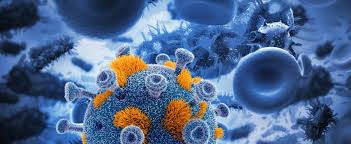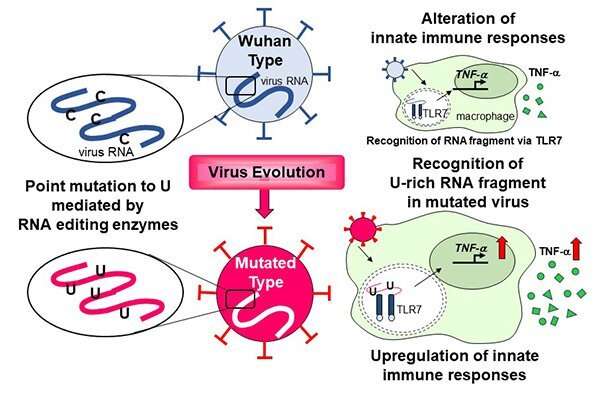COVID-19 Immunogenomics: Japanese Study Uncovers Uracil Switch In SARS-CoV-2 Genome That Alters Innate Immune Responses
Source: COVID-19 Immunogenomics Nov 12, 2020 5 years, 3 months, 4 days, 7 hours, 35 minutes ago
COVID-19 Immunogenomics: Japanese scientist from Tohoku University have found that human editing enzymes are likely behind a type of mutation in the COVID-19 virus that stimulates the release of pro-inflammatory molecules called cytokines by immune cells in the body.

SARS-CoV-2 infection induces severe pneumonia and is the cause of a worldwide pandemic. Coronaviruses, including SARS-CoV-2, have RNA proofreading enzymes in their genomes, resulting in fewer gene mutations than other RNA viruses. Nevertheless, variants of SARS-CoV-2 exist and may induce different symptoms; however, the factors and the impacts of these mutations are not well understood.
The study team found that there is a bias to the mutations occurring in SARS-CoV-2 variants, with disproportionate mutation to uracil (U). These point mutations to U are mainly derived from cytosine (C), which is consistent with the substrate specificity of host RNA editing enzymes, APOBECs.
The study team also found the point mutations which are consistent with other RNA editing enzymes, ADARs. For the C-to-U mutations, the context of the upstream uracil and downstream guanine from mutated position was found to be most prevalent.
Further, the degree of increase of U in SARS-CoV-2 variants correlates with enhanced production of cytokines, such as TNF-α and IL-6, in cell lines when compared with stimulation by the ssRNA sequence of the isolated virus in Wuhan. Therefore, RNA editing is a factor for mutation bias in SARS-CoV-2 variants, which affects host inflammatory cytokines production.
The study findings are published in the journal: Scientific Reports.
https://www.nature.com/articles/s41598-020-74843-x
The findings are is important for understanding how the SARS-CoV-2 coronavirus is evolving.
Importantly the genetic material of coronaviruses, including the SARS-CoV-2 virus that causes COVID-19 infection, is contained in a single strand of RNA.
It is known that coronaviruses have fewer genetic mutations compared to other RNA viruses because they have a kind of RNA-proofreading machinery that protects them. Nevertheless, they still do have some mutations, and scientists would like to understand how they come about and what their effects might be.
Dr Emi Furusawa-Nishii an immunobiologist from Tohoku University along with his colleagues investigated the genome sequences of almost 8,000 SARS-CoV-2 viruses from an international database. They specifically looked for "point mutations," in which a nucleotide base within the virus's RNA is switched to another base.
The study team’s detailed analyses found that virus strains that had evolved from the original one isolated in Wuhan, China had a disproportionate number of cytosine bases that were switched to uracil, in addition to a number of other nucleotide base switches.
Further analyses of the nucleotide bases preceding and following these point mutations suggested they were caused by two types of human editing deaminase enzymes, called APOBECs and ADARs.
The researchers then
wanted to study the effects of the mutations on macrophages: a type of white blood cell that forms part of the body's first line of defense, or its innate immunity.
The team tested the production of two pro-inflammatory cytokines, called tumor necrosis factor-alpha and interleukin-6, by human macrophage cell lines. The cells were stimulated with an RNA fragment from Wuhan-type or mutated-type SARS-CoV-2 viruses. Surprisingly, they
found that the uracil-rich RNA fragment in the mutated-type SARS-CoV-2 viruses increased the production of the two cytokines.
 Uracil point mutations found in SARS-CoV-2 varieties increased the release of pro- inflammatory molecules by macrophages. Credit: Tohoku University
Uracil point mutations found in SARS-CoV-2 varieties increased the release of pro- inflammatory molecules by macrophages. Credit: Tohoku University
Dr Furusawa-Nishii told Thailand Medical News, "Our study findings suggest that the point mutations we detected in SARS-CoV-2 viruses were caused by RNA editing as part of the human defense reaction against the infection. They also show that the virus's evolution is increasing innate immune responses in the host."
The study team says further studies are needed to determine whether this increased innate immune response helps efficient virus elimination or if it leads to an aggravation of symptoms.
Interestingly the phylogenetic network analysis using 7804 sequences of SARS-CoV-2 variants reveals that the mutations to U were over 2500-times more frequent than mutations from U. In addition, the number of Us within the full length ssRNA in each SARS-CoV-2 variant is significantly increased compared to the original isolate. Thus, the ability of full-length mutated ssRNA to induce inflammatory cytokines may be greater than that of the original isolate. These results suggest that this could be one mechanism via which SARS-CoV-2 gene mutations cause increased inflammatory activation.
The study findings suggest that the biased point mutations of SARS-CoV-2 variants are induced by RNA editing during the host defense reaction against viruses. Thus, the evolution of this virus results in increased immune activation due to the selective pressure of host defense.
For more on
COVID-19 Immunogenomics, keep on logging to Thailand Medical News.

